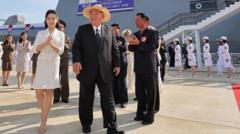The decision comes in light of recent political changes, signaling a shift towards diplomatic engagement, while drawing mixed reactions from both citizens and human rights advocates.
South Korea Halts Propaganda Broadcasts to North Korea

South Korea Halts Propaganda Broadcasts to North Korea
In a bid to foster better relations, South Korea has temporarily stopped its loudspeaker propaganda aimed at North Korea.
South Korea's military has announced the suspension of loudspeaker propaganda broadcasts directed at North Korea, which has been a point of contention between the two nations. This strategic move, aimed at "restoring trust" following the election of President Lee Jae-myung, marks a significant shift in diplomatic relations between the Koreas.
Lee, who emphasized improving inter-Korean ties during his campaign, is reacting to a history of escalating tensions under former President Yoon Suk Yeol, whose hardline approach led to his impeachment. The loudspeakers have been a contentious issue; while South Korea used them to share news about democracy and life in the South, North Korea has viewed them as provocative, threatening to destroy them on multiple occasions.
Despite the historical context, organizations advocating for North Korean human rights have condemned the silence of the loudspeakers. They argue that the broadcasts served as a critical connection to the outside world for North Koreans and signal a retreat towards appeasement of the Kim regime. Hana Song, an executive director of a Seoul-based human rights group, criticized the decision, warning of the potential consequences of increased isolation for North Korean citizens.
Residents of South Korean border regions, however, have welcomed the decision, citing the constant noise from both sides as a disruption to daily life. Local authorities have expressed hope that this reduction in loudspeaker activity may bring an end to what they describe as "psychological warfare."
The halt follows a significant period marked by retaliatory measures involving balloons filled with propaganda and trash sent from North Korea to the South, which had prompted South Korea to resume its broadcasts last year. Currently, the military's suspension suggests that should relations worsen again, these broadcasts could resume, providing a tool for influence as necessary.
The Korean Peninsula remains in a state of conflict, technically still at war since the ceasefire of 1953, with calls for peace ongoing yet seemingly distant in light of recent events.
With careful monitoring and diplomacy, this move is a pivotal opportunity for both countries as they navigate their complicated histories and aim for a more favorable future.
Lee, who emphasized improving inter-Korean ties during his campaign, is reacting to a history of escalating tensions under former President Yoon Suk Yeol, whose hardline approach led to his impeachment. The loudspeakers have been a contentious issue; while South Korea used them to share news about democracy and life in the South, North Korea has viewed them as provocative, threatening to destroy them on multiple occasions.
Despite the historical context, organizations advocating for North Korean human rights have condemned the silence of the loudspeakers. They argue that the broadcasts served as a critical connection to the outside world for North Koreans and signal a retreat towards appeasement of the Kim regime. Hana Song, an executive director of a Seoul-based human rights group, criticized the decision, warning of the potential consequences of increased isolation for North Korean citizens.
Residents of South Korean border regions, however, have welcomed the decision, citing the constant noise from both sides as a disruption to daily life. Local authorities have expressed hope that this reduction in loudspeaker activity may bring an end to what they describe as "psychological warfare."
The halt follows a significant period marked by retaliatory measures involving balloons filled with propaganda and trash sent from North Korea to the South, which had prompted South Korea to resume its broadcasts last year. Currently, the military's suspension suggests that should relations worsen again, these broadcasts could resume, providing a tool for influence as necessary.
The Korean Peninsula remains in a state of conflict, technically still at war since the ceasefire of 1953, with calls for peace ongoing yet seemingly distant in light of recent events.
With careful monitoring and diplomacy, this move is a pivotal opportunity for both countries as they navigate their complicated histories and aim for a more favorable future.



















